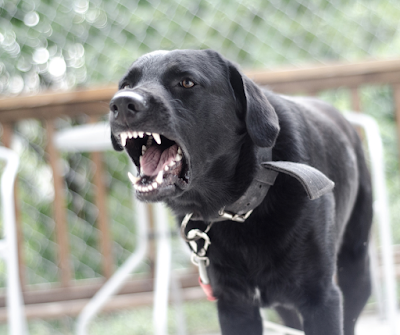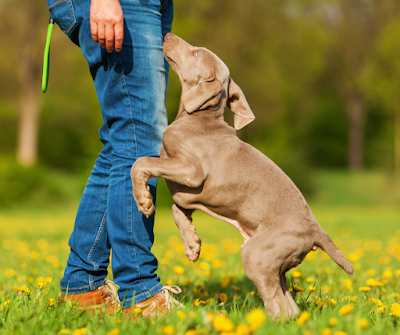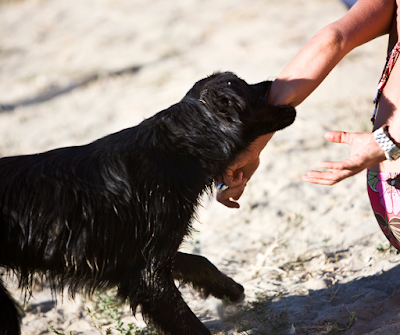If you are new to dog ownership, knowing common behavioral issues will help. These canine friends sometimes become aggressive, show unusual attitudes, or feel depressed.
Read on to learn about the most common behavioral problems of dogs.
Chewing
Excessive chewing can be an alarming sign. If chewing is causing destruction, it can be because of various reasons.
Cavapoo puppies, Golden Retrievers, Chihuahua, and many other breeds are known for destructive chewing. Thankfully, resolving this issue is simple.
Managing your dog's chewing behavior involves providing the right tools and guidance.
It's essential to understand that chewing is a natural activity for dogs, so giving them a variety of appropriate chew toys can keep them satisfied and prevent them from gnawing on things they shouldn't. Regularly rotating these toys can also control their interest.
Keeping an eye on your dog is paramount, especially during their chewing phases. When supervision isn't possible, creating a safe space for them where they can't access forbidden items is a good strategy. This approach might mean using a crate or sectioning off a part of your home.
Physical exercise and mental stimulation are vital in preventing destructive chewing. A tired dog has less pent-up energy to expend on your furniture or shoes.
Training is also an invaluable tool. Teaching your dog commands like 'leave it' or 'drop it' and reinforcing positive behavior when they chew their toys can encourage good habits.
For dogs that chew out of anxiety, particularly when they're alone, addressing the root cause of their stress is essential. This step might require setting up a comforting space or consulting a behavioral expert for more severe cases.
Remember, it's ineffective and unfair to punish your dog for chewing after the fact, as they likely won't understand the reason for the punishment. If you catch them in the act, redirect them to an appropriate chew toy instead.
For puppies, teething is when they need to chew, and providing them with frozen chew toys can help soothe their gums.
Inappropriate Urination
Home-trained dogs urinate inside the house. Some also have particular areas in their yards to do their business.
But, if they urinate in other unusual areas, find out the cause.
Due to Medical Issues
Distinguishing between a medical issue and a behavioral issue when your dog is urinating in inappropriate areas involves some detective work.Medical problems can cause a loss of bladder control or increased frequency in urination, so if this behavior is new or has suddenly worsened, a vet visit is the first step. Your vet can check for infections, diabetes, kidney issues, or other health concerns.
Due to Behavioral Issues
Behavioral issues, on the other hand, often have triggers such as anxiety, territorial marking, or inadequate housebreaking.If your dog is medically cleared, consider what might have changed in their environment. New pets, new people, changes in routine, or even new furniture can cause stress-related urination.
Also, look at the timing and location of the incidents—behavioral marking usually occurs on vertical surfaces and is consistent with stress or territoriality.
A combination of medical management, if needed, and behavioral modification techniques typically works best. It's also crucial to clean any soiled areas thoroughly to remove the scent and discourage repeat offenses.
Chasing
Chasing behavior in dogs is natural, and it can often be seen in those with a strong instinct to hunt or herd.
To manage this, understanding why your dog chases is crucial. Start with solid basic obedience training, teaching commands such as 'sit,' 'stay,' 'come,' and 'leave it,' which can help prevent chasing in the heat of the moment.
You can also give treats or toys to distract and redirect your dog's attention away from potential chase targets.
Keeping your dog on a leash in risky areas ensures their safety, while a long line can give them some freedom without the risk of them running off.
Regular physical and mental exercise can also reduce chasing by keeping your dog's energy levels in check and their mind engaged.
If the chasing becomes intense or poses a danger, it's wise to seek advice from a professional trainer or behaviorist.
Barking
Almost every dog barks. But, unusual and consistent barking for a long time is a sign of a behavioral issue.
Some dogs bark more than usual to seek attention, while others do it because of boredom. They can even bark if they are in pain or are incredibly excited.
Again, training plays a significant role here. But, you need to show consistency and have some patience. Regular exercise, love, attention, and care will help your dog eliminate excessive barking.
Digging
Some dogs love digging due to their instincts. For example, terriers dig a lot due to their hunting history. However, if the digging becomes excessive, regardless of the breed, this may become destructive.
You can dedicate a separate portion of your yard if your dog is mentally fit and finds it fun. Train him to dig in this area only.
However, dogs also dig because of anxiety, boredom, or excessive energy. Many of them have a desire to secure their possessions.
In this case, train them to share things with other dogs. A little training can resolve this issue.
Begging
It is hard to say "no" to a begging dog. But this behavior can cause canine obesity and digestive issues.
If the dog is growing and becoming hungrier, increase the size of the meal. Never praise it for begging.
Confine the dog in another room when the family members are eating. If it behaves well, give it a treat.
Make sure that you opt for healthy choices for a treat. Things that are excessive in calories are bad for your dog's health.
Jumping Up
Dogs often jump to greet their mothers or owners. They can even jump if they see something in your hand. This behavior is dangerous and needs urgent attention.
A simple way to resolve this problem is ignorance. Never touch your dog when it jumps. Don't make any eye contact or any commands.
Be consistent and wait for him to calm down. After some time, the dog will learn to calm down to get your attention.
Biting
Puppies are taught by their mothers not to bite too hard - when a puppy bites its littermate too hard, all the fun stops.
Likewise, dog owners can do biting inhibition training. It is a training in which dog owners train pups to bite without pressure.
It's important to note that this specific training resolves the excessive biting's harmful impacts but not the behavior itself.
Knowing the cause behind biting is essential. Some dogs bite because they are in pain, while others have fear or do not want to socialize.
In this case, give proper attention to your dog. Take it for a morning walk, encourage socialization, and show love.
Dog aggression is a serious issue and needs immediate action. Despite the common myth, experts claim that aggression is unrelated to breed.
Aggression
In most cases, the causes of aggression are the same as in biting. Therefore, advice from a dog expert is essential.
Remember, it takes time to see improvement in aggressive behavior. You need to be patient and stay consistent.
Never leave your dog alone when it's aggressive. It may worsen the problem.
Separation anxiety is one of the most talked-about behavioral problems in dogs. Here are some of its symptoms:
Separation Anxiety
- A dog feels anxious when the owner is preparing to leave.
- It misbehaves in the absence of the owner.
- It wants to touch the owner all the time.
Give rewards for good behavior and stay consistent. Also, leave the dog in an area where it can play and have fun.
Dealing with Behavioral Problems in Dogs
Bringing a new dog into your home is an exciting journey filled with joy and, admittedly, some challenges.
As you've read, common behavioral issues like chewing, inappropriate urination, chasing, barking, digging, begging, jumping up, biting, aggression, and separation anxiety are hurdles many dog owners face. Understanding that these behaviors are often natural and intuitive is the first step toward addressing them.
From the playful nibbles of a teething puppy to the anxious barks of a dog missing its owner, each behavior is a communication effort from your dog, an attempt to tell you something.
With the right approach—be it through providing suitable chew toys, establishing a routine, or seeking professional advice for more complex issues—you can guide your dog towards healthy habits and acceptable behaviors.
Remember, patience and consistency are your best tools. Dogs are incredibly perceptive and responsive to their owner's guidance and emotions.
By taking the time to understand the 'whys' behind their actions, reinforcing good behavior, and providing plenty of love and attention, you'll address the immediate issues and strengthen the bond between you and your furry companion.
As you embark on this journey with your new dog, embrace the challenges with a spirit of learning and understanding. Your home will soon become a happy rhythm with your latest family member.

























0 comments:
Post a Comment